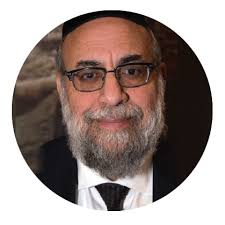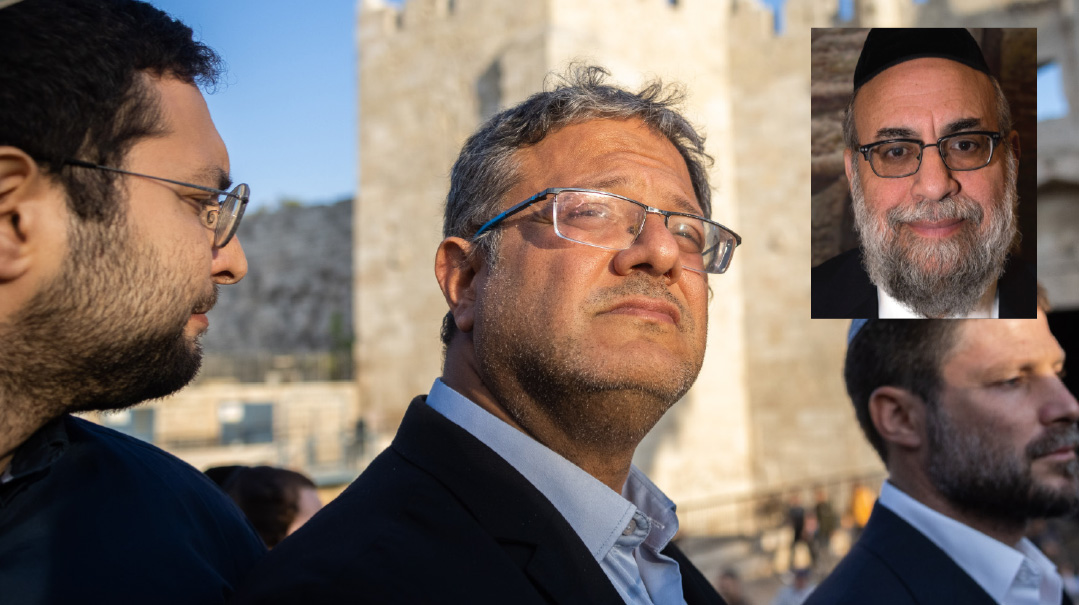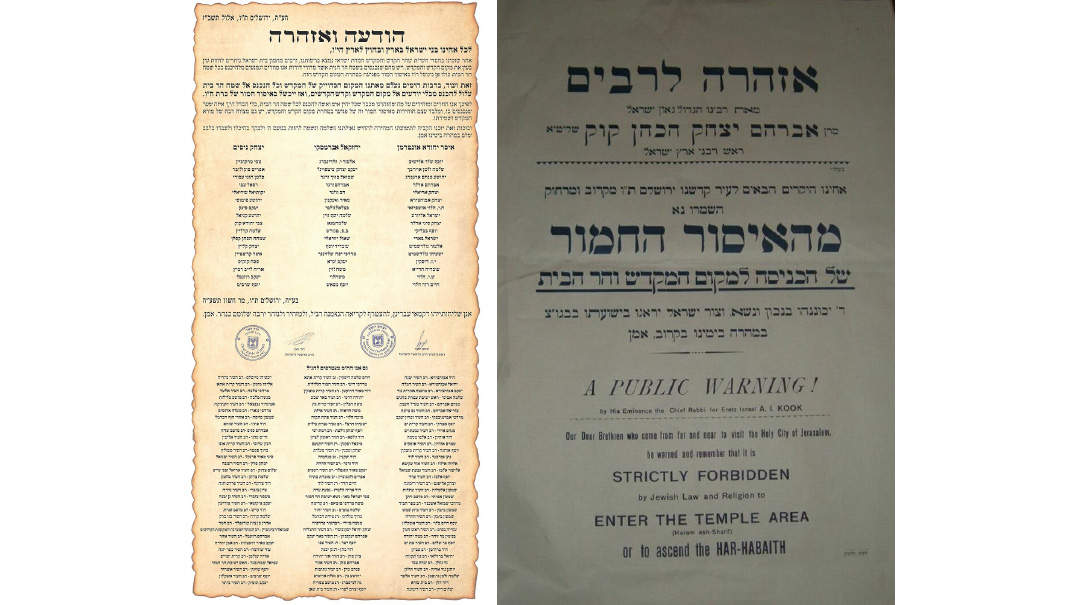Ben Gvir and the Third Rail

Should even one Jew somewhere in the world lose his life, chas v’shalom, because of Itamar Ben Gvir’s very public incitement?

TO clear up any possible misconceptions that most readers probably have after reading the title: It will neither be political (anyone familiar with my writing knows I’ve never written a political piece) nor will it be a halachic piece (as this is not the proper forum for it).
It’s a personal response to an incident I witnessed at the Kosel on the second night of this past Chanukah, when my wife and I went there to daven and participate in the lighting. I will return to that very soon.
First, some background is in order.
In the late 1960s, I attended an elementary school in Kew Gardens, Queens, called Yeshiva Tiferes Moshe. My first few years there, the yeshivah was housed in an antiquated mansion that was way too small for the growing student body. So for three years, the yeshivah relocated to a vacant public school building in Jamaica, Queens, while the mansion was demolished and a new building was constructed in its place, where it remains to this very day. My class was the first eighth grade in the new building.
The older grades learned an hour later than the younger grades, so there were no school buses to take us home. We had to ride public transportation — two trains and a bus — back to Forest Hills each and every day.
This neighborhood did not normally have religious Jewish children walking its streets (especially on dark winter evenings), so the trek home was challenging at times. Often, our incredibly dedicated menahel, Rav Avrohom Levine z”l, would escort us in his car to ensure our safety as we walked the few blocks to the train station. When the neighborhood teenagers figured this out, they would wait until he departed and then confront us inside the train station.
One day our small group was surrounded by a few neighborhood tough guys, and they ripped a yarmulke off the head of one of our boys and tossed it onto the train tracks. They enjoyed a good laugh at our expense and then ran off.
The thing was that Herbie, the boy they picked on, was a fearless type of fellow. He decided he would quickly jump onto the tracks and retrieve his yarmulke. We implored him not to, as we knew that touching the electrified “third rail” that powered the trains was deadly, and none of us was actually sure which one it was.
Herbie was not going to listen to us and was about to show us his fearless side. Just then, a passing elderly man saw what was happening and called out to Herbie, “I think your hat is actually lying on top of the third rail, but I’m not sure.”
Thankfully, Herbie thought about it for a moment and decided not to attempt it. A few minutes later, the train pulled in, and we were on our way home (although missing one yarmulke).
As we parted ways at the last stop, I asked Herbie what made him decide not to jump onto the tracks. His response is as clear in my mind as if it had been five days ago, rather than 50 years: “I was really convinced that I could do it and nothing would happen to me. But when that man showed me real concern and said, ‘It may be the third rail,’ I figured, why should I take a chance? After all my very life is at stake.”
IN
the last election in Eretz Yisrael, Itamar Ben Gvir drew the most attention of all the people running, and he continues to draw the lion’s share of attention today. I offer no opinion on his policies or his ideas for the government. I just want to discuss one of his most widely known positions, and that is how he feels about visiting Har Habayis.
I have long struggled to understand how people who are thoroughly committed to Torah and to our mesorah can have so little regard for an issue that the gedolei hador from all segments of Klal Yisrael have expressed such strong views about: that going onto Har Habayis involves a cheshash chiyuv kareis.
Those who forbade this include Rav Shlomo Zalman Auerbach, Rav Yosef Shalom Elyashiv, Rav Elazar Menachem Shach, Rav Chaim Kanievsky, Dayan Yitzchak Yaakov Weiss, the Tzitz Eliezer; all the previous chief rabbis of Israel; 52 of the leading gedolim and poskim after the Six Day War; and all of those who signed on a kol korei forbidding Yidden to go onto Har Habayis. And that list included Rav Tzvi Yehudah Kook and many of the leading rabbanim of the religious Zionist community.
Recently, Rav Dovid Cohen, rosh yeshivah in Yeshivas Chevron, in a fiery public speech against Ben Gvir, noted that the Torah equates defiling the Beis Hamikdash with chillul Hashem, and concluded, “This man is the biggest mechallel Sheim Shamayim of the generation!”
Yes, we have all heard Ben Gvir and others counterclaim, and rightfully so, that their rabbanim allow it. One can never win a halachic argument with them on this topic (as I and many others can attest). There is no one on their side prepared to listen to anyone who holds differently.
What I would say to Ben Gvir is just two points.
One is, maybe this is like the third rail. Yes, maybe all these gedolei hador of the last hundred or so years did not understand the halachic issues the way your poskim do, who allow it. But maybe, just maybe, it is really the “third rail.” It may just be that those ascending Har Habayis risk a violation of an issur kareis.
I would suggest that if a headstrong 12-year-old could understand the potential danger of coming into contact with the third rail, it should be possible for the Ben Gvirs of the world to at least spare some serious concern for the potential “third rail” of Har Habayis.
Another argument often heard from the other side of this dispute not only borders on the absurd, it’s also totally false. And that is that the people who speak out against going onto Har Habayis, the holiest place for a Jew on this earth, lack, on some level, a deep love for kedushas ha’Aretz. Absurd indeed.
The great gaon and tzaddik Rav Eliyahu Dovid Rabinowitz-Teumim, known as the Aderes, arrived in Yerushalayim to be the assistant and future successor of Rav Shmuel Salant. However, a mere four years later, Rav Shmuel was maspid his much younger assistant upon his untimely passing. In his hesped, he said that “the sensitive soul of the Aderes couldn’t bear to see the holiest and most sacred place in the world defiled under the rule of impurity, and he died from the heartache.” Rav Avigdor Nebenzahl, the rav of the Rova, recently commented to an interviewer, “If I had the heart of the Aderes, then I wouldn’t have been able to live here all these years.”
A
Yerushalayim resident once asked Rav Shlomo Zalman Auerbach whether he should tear kri’ah at the Kosel if he didn’t come once every 30 days. Rav Shlomo Zalman responded that if he didn’t come to the Kosel once in 30 days, he should definitely not rip his clothes, because he showed he simply didn’t care. And if he didn’t care, then what was the point of ripping? It was only bal tashchis.
When the Six Day War ended and the Old City was back in Jewish hands, Rav Shach was extremely happy that Yidden would be safer. His son-in-law Rav Meir Tzvi Bergman heard that Rav Shach was in a joyous mood and came to be with him. Upon seeing him, Rav Shach burst into tears.
Rav Bergman asked him, “What caused the shver to go from joy to tears so quickly?”
Rav Shach explained, “Now that Har Habayis is accessible, who knows how many people are going to go up there out of personal desire, and then be chayev kareis?” And Rav Shach continued crying.
In the early 1980s my rebbi, Rav Henoch Lebowitz, the rosh yeshivah of Yeshiva Chofetz Chaim, came to visit Eretz Yisrael for a few weeks. The Rosh Yeshivah had an incredible love for Eretz Yisrael. One day after a visit to the Kosel to daven Minchah, he mentioned that he had never seen the streets of the Old City. I made plans for a walking tour of the Rova the next day to show him the sights. The Rosh Yeshivah was not in the best of health, and I felt that an hour would be the most he could do. But on the tour, the Rosh Yeshivah walked and walked, refusing to stop for over four hours. He just couldn’t get enough of every daled amos in the holy city of Yerushalayim, and he continued until he literally had no strength to continue.
What I remember most of all was bringing the Rosh Yeshivah to the courtyard of the Arab school off the Shuk from which you could actually see Har Habayis through the wrought-iron bars on the windows. He turned white as a ghost and began to tremble at being so close to the Makom Hamikdash. He was petrified to approach the window, as it might have been a little too close to the halachic boundary one is not allowed to cross.
The common denominator between the Aderes, Rav Shmuel Salant, Rav Nebenzahl, Rav Shlomo Zalman, Rav Shach, and my rebbi is that they all had an incredible love for Eretz Yisrael and simultaneously an incredible eimah and yirah for Har Habayis.
Another refrain often heard goes, “Only by pushing through and showing the world and HaKadosh Baruch Hu how much we value the holiness of that place and how much we long for the rebuilding of the Beis Hamikdash will we merit to bring Mashiach.”
To answer that argument, we have the words of the Brisker Rav, who once responded to another person’s opinion that taking a public position on a certain issue would merit bringing Mashiach. To that he responded, “Even if we knew that a particular action would directly bring Mashiach and not doing it would definitely hold back Mashiach, and the action itself was not the retzon Hashem, then better it not be done and Mashiach not come.”

T
ruthfully, Ben Gvir has now raised the stakes to a totally different level. Following the elections, he is now a controversial figure in the new government, with the entire world watching his every move. No longer can his visits to Har Habayis remain a strictly personal or private matter. His actions are now front and center for the entire world to observe; the Arab world has called it “a hostile takeover of the holy Muslim site.” We Jews don’t see it that way, but the entire world does, as heard in the condemnations ringing in the halls of the UN a few weeks ago.
Hundreds of millions of Muslims throughout the world are enraged. One question I would think might cross his mind is whether this is not exactly what Chazal explain at the end of Maseches Kesuvos, concerning the prohibition of challenging the nations of the world. But there is an even more fundamental question than that.
Should even one Jew somewhere in the world lose his life, chas v’shalom, because of Itamar Ben Gvir’s very public incitement? Would Ben Gvir be able to stand by the words of “Yadeinu lo shafchu es hadam hazeh”? If he couldn’t, then he must cease and desist immediately from ascending Har Habayis, until he returns to civilian life.
There is no justification of any sort, for any cause — even to build the Beis Hamikdash itself — at the expense of even one Jewish life.
The Chasam Sofer juxtaposes two halachos regarding chillul Shabbos. One halachah is that it is forbidden to engage in building the Beis Hamikdash on Shabbos. But if building it offered the slightest possibility of saving the life of a Yid, chillul Shabbos would not only be permitted, it would be mandated. We see, says the Chasam Sofer, that however lofty the Beis Hamikdash is, the life of even one Yid is still greater.
W
hen I shared with a respected community rav my intent to write an article about the growing trend nowadays for people to visit Har Habayis, he responded, “What’s the point? Do you really think anyone will stop going because of what you write?”
I responded that I was not naive enough to believe that anyone — let alone Ben Gvir, despite the recklessness of his actions — would stop going because of my article, or because of anyone else’s article, for that matter. That is not who I am writing this article for. Allow me to return to the incident I mentioned at the beginning of the article.
On the second night of Chanukah, my wife and I went to the Kosel to witness the menorah lighting ceremony. Each night, a different government official was given the honor of making the brachah and lighting the beautiful golden menorah. On that night, the person so honored was Itamar Ben Gvir.
Because he was so popular, he naturally drew a large group of observers and admirers. What I found troubling was that among the group of admirers were some 100 to 200 bochurim, from many different yeshivos. (For the most part, they were American students.) I watched them interact with Ben Gvir.
They were not merely showing the excitement of meeting a public figure whose name and features were splashed across the front pages of every newspaper and magazine for months on end. It was so much more. It was adulation and hero worship. They were tripping over each other to take a picture with him or shake his hand. Just being in his daled amos was making some of these yeshivah students euphoric.
After the lighting ceremony, some of the bochurim joined the Maariv minyan that I participated in, and a few actually introduced themselves to me after davening. (One even commented how much he enjoys reading my articles. I hope he reads this one as well.) They were still elated at having had the opportunity to meet Ben Gvir. I asked them if they were aware that he regularly and publicly goes up on Har Habayis when their own rebbeim, and the rebbeim of their rebbeim, hold that it’s strictly assur to do so.
They all responded that they would never go onto Har Habayis because of the issur involved. One of the bochurim actually shared that his maternal grandfather was one of the 52 signatories on the kol korei publicized in 1967 reaffirming the prohibition of going onto Har Habayis.
I questioned the hero worship and adulation they displayed. I mentioned that it was seemingly misplaced, when such a serious violation of halachah according to the significant majority of gedolei poskim was manifested in front of the whole world. Respect for his position of importance, and for his incredible dedication to Am Yisrael and Eretz Yisrael, is proper, but the feelings of hero worship and adulation are not.
Years ago, Shimon Peres went to visit with Rav Elyashiv, for whom he had great respect, before Rosh Hashanah to ask for a brachah for the new year. Rav Elyashiv, with great emotion, asked him to please use all his power and influence to prevent Yidden from going onto Har Habayis. Rav Elyashiv didn’t delve into the intricacies of the machlokes of the Rambam and the Ravaad; nor did he discuss the shitah of the Radvaz.
He simply pleaded with him, “Mir darfen rattaven Yidden” — we need to rescue Yidden from the fallout and dangers of going onto Har Habayis.
Ben Gvir, please: “Mir darfen rattaven Yidden.”
(This article was written l’zecher nishmas Sara Chaya bas Chaim Aryeh Zev.)
(Originally featured in Mishpacha, Issue 950.
Oops! We could not locate your form.







